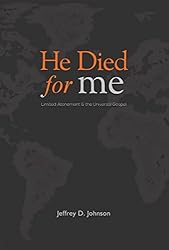How can the atonement be limited in its efficacy without restricting the content or the scope of the free offer of the gospel?

In his book, He Died for Me, Jeffrey D. Johnson seeks to solve the dilemma on how the death of Christ can be sufficient for all without being applied to all. Johnson argues that, “Christ’s federal union with His elect people is the cause of the atonements efficacy and Christ’s organic union with the human race (due to His Incarnation) is the cause of the atonement’s sufficiency, therefore, the death of Christ can be both limited in its efficacy and universal in its sufficiency” (188).
To begin, in the first half of the book, Johnson looks at and expands on the common four differing views held by many Christians on Limited Atonement and the Universal Offer of the Gospel:
Hyper-Calvinism (Quantitative Model): Limited Efficacy, Limited Sufficiency, Limited Offer
High Calvinism (Quantitative Model): Limited Efficacy, Limited Sufficiency, Universal Offer
Moderate Calvinism (Qualitative Model): Limited Efficacy, Universal Sufficiency, Universal Offer
Low Calvinism (Qualitative Model): Universal (No) Efficacy, Universal Sufficiency, Universal Offer
After examining all sides adequately, Johnson addresses the final question: How can the death of Christ be sufficient for all if it is efficacious (securing faith) for only the elect, and how can the gospel be a sincere promise of salvation to all if Christ did not effectively die for all? Jeffrey D. Johnson argues that many theologians in the past, whether Hyper-Calvinists, High, Low, etc., all forgot to factor in the one gift that God has given His people that was not procured by the death of Christ – election. He states, “Being elected in Christ is the first gift that God gave to His people. It all starts with being chosen in Christ. That is, God’s people were elected in Christ before the foundation of the world (Eph. 1:4)….The atonement of Christ would be of no value if there was no union available between Christ and sinners. Before anyone can personally enjoy the saving benefits of redemption, they must be united to Christ. And according to the Bible, there are three types of unions that are necessary for salvation: federal union, organic union, and personal union.”
To complete his agreement, Johnson looks at the three areas of union to support Limited Atonement and the Free Universal Offer of the Gospel. First, the Federal Union (Election) secured Limited Efficacy, i.e., the eternal union between Christ, as the Federal Head, and His elect, causes the cross to be efficacious for only the elect. Therefore, “when Christ died, those who were in legal union with Him, died with Him. Because Christ and His people were considered as one in the eyes of God, their sins (in a qualitative sense) were imputed to Christ as He bore the wrath they deserved on the tree” (174).
Secondly, the Organic Union (Incarnation) secured Universal Sufficiency, i.e., the Organic Union causes the cross to be universally sufficient without being efficaciously applied to any. Therefore, “mankind has a gospel provided for them because they have a proper representative from their own ranks.” Since Christ had an Organic Union to humanity through the Incarnation, “this allows for the price Christ paid to redeem His chosen people to be a sufficient price to redeem the whole world. Just as Christ’s perfect righteousness would have been needed for God to justify a single person as it would have been for Him to justify every person, so Christ’s perfect sufferings would have been needed for God to forgive a single person as it would have been for God to forgive every person. Thus, the universal sufficiency is secured by Christ’s organic unity with humanity” (177).
Thirdly, Johnson looks as Personal Union (Faith), which is the promise of the Gospel. Without faith in Christ alone, all men, whether elect or non-elect, remain under the wrath of God. Thus, we are called to call all men indiscriminately to repentance and faith in Christ alone!
Though you might not agree with every agreement Johnson has, this book sure has stretched my mind and challenged me to examine the Word of God. It is a great mystery that we may not understand until glory!
I want to leave you with the final words of Jeffrey Johnson:
“There is a real provision made for all, and a real provision offered to all. As Christ’s ambassadors, let us, therefore, with boldness follow Christ’s command to beseech all to be reconciled to Christ by faith. Though the salvific effects and benefits of Christ’s death are intended, limited, and effectual for only the elect, the universal gospel is warranted because it is based on the universal sufficiency of the atoning work of Christ” (188). Jeffrey D.
Johnson’s new book, He Died For Me, is now available in paperback and kindle online.
Click here for Amazon.ca
Click here for Amazon.com
Leave a Reply